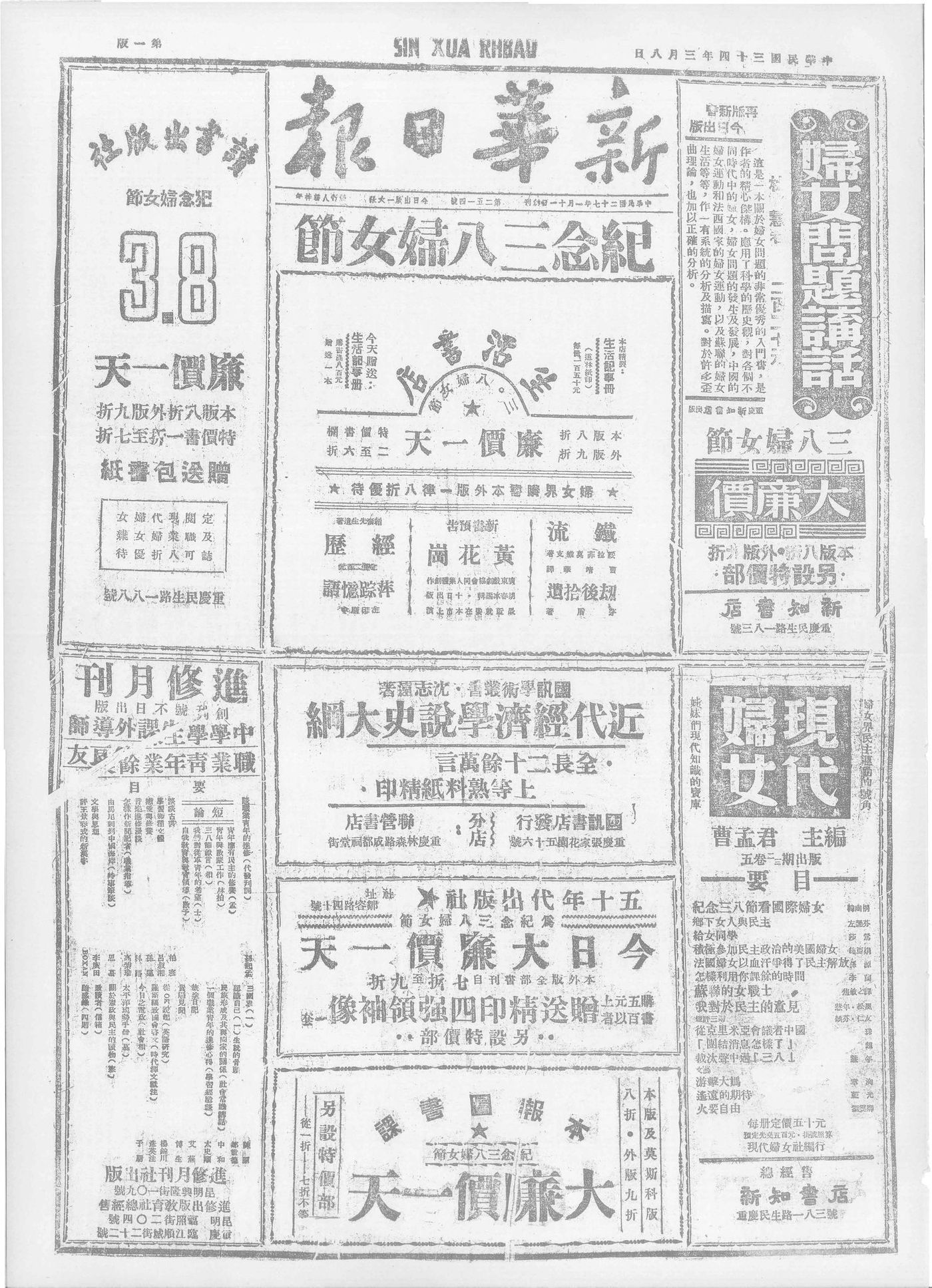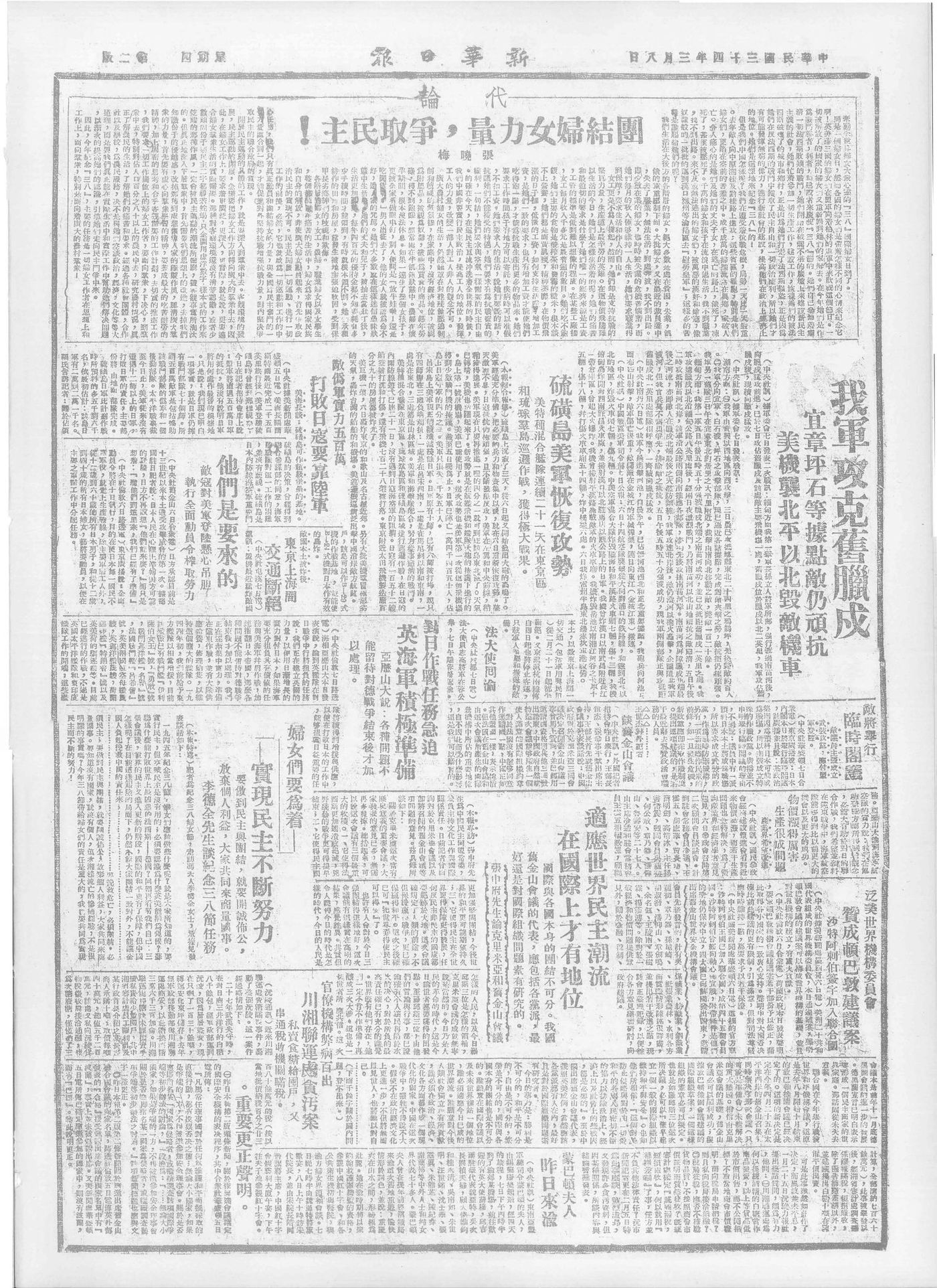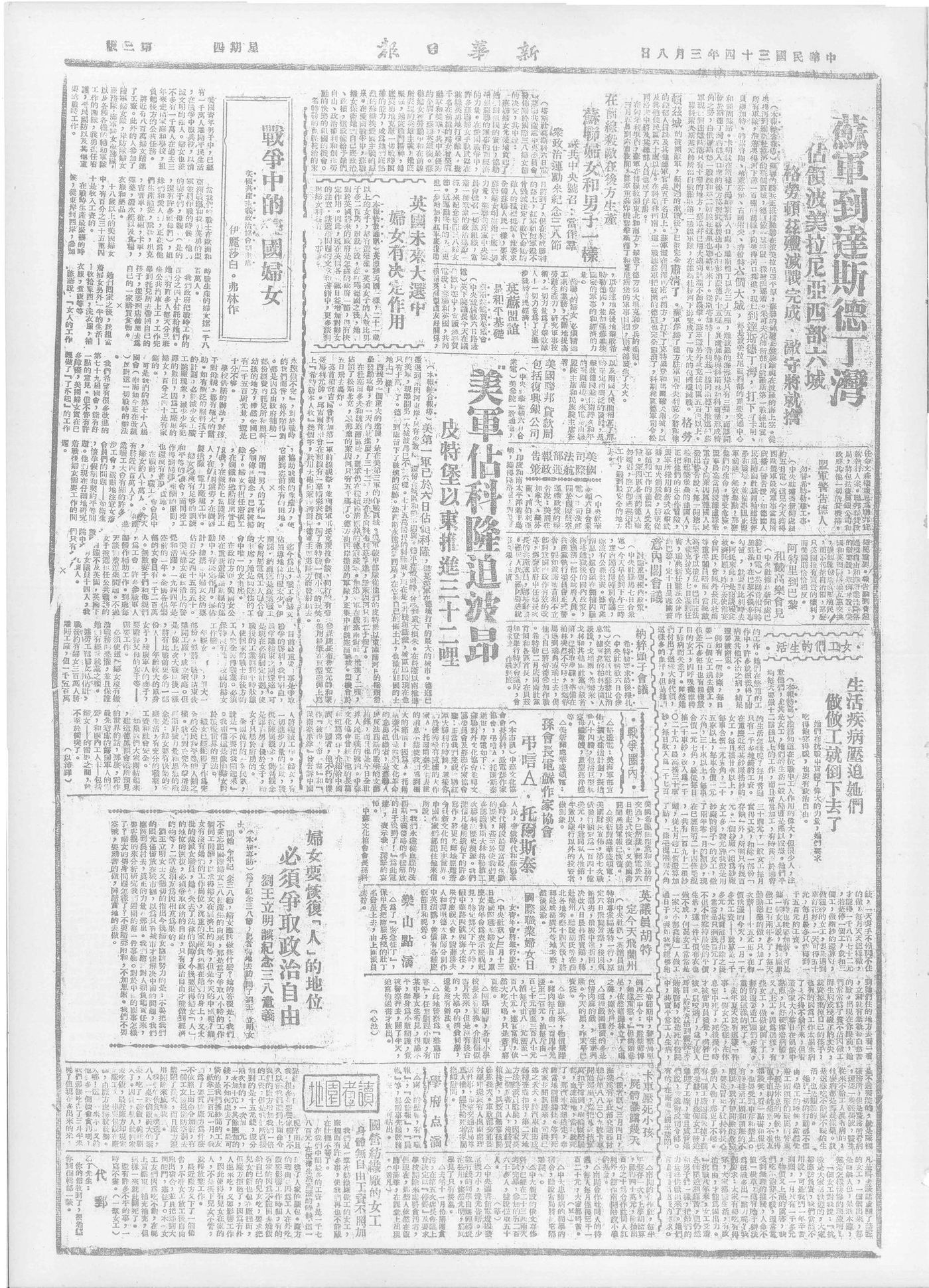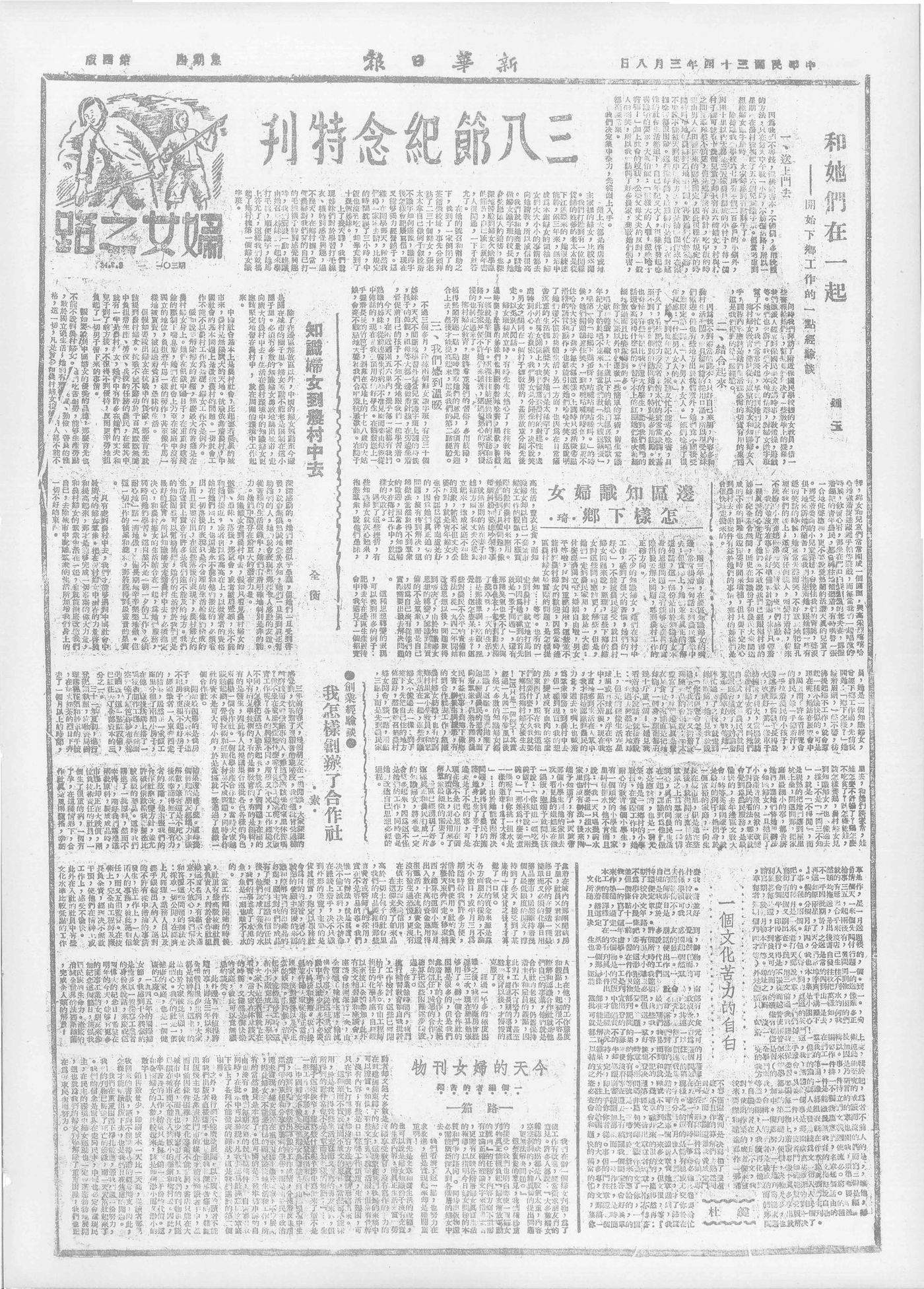An old Republican newspaper that hints at how we're going beyond the 'Battle of the Labels'
Press: The recent label turmoil has caused heartache to relatives and anger to enemies. Many progressives have fallen into reflection. This account wants to express their opinions, but they are afraid of further tearing up public opinion and disrupting the deployment of lawsuits. matters is a good place to discuss issues, and there are relatively few reactionaries on it.




Recently, I went to Taobao in Wenwan Market and found a piece of "Xinhua Daily" in 1945. The date of publication was March 8th. (At that time, the Kuomintang and the Communist Party cooperated in the Anti-Japanese War, and this newspaper was legally distributed in Chongqing, the capital city.)
Saying "it's on March 8th" seems a bit contrived. Obviously, this issue of the newspaper is a "long-planned" work by the editorial department. It can be seen from the front page of various progressive publications and lectures on marketing. This full-page patchwork "Women's Day Big Price Cut" is so much higher than today's "3.7 Goddess Day" that I don't know where it went~
The headline on the second page was an editorial. Commentator Zhang Xiaomei (formerly Zhang Xizhen), who served as the chairman of the Beijing Women's Federation after the founding of the People's Republic of China, and whose sister Zhang Xiyuan was Deng Xiaoping's first lover. (It is ironic that a few years ago, a member of the Chinese People's Political Consultative Conference and the president of the "China Beauty Fashion News" newspaper was also named Zhang Xiaomei, and she actively participated in the construction of women's culture after the reform and opening up). The editorial showed the picture of the women's movement at that time from the perspectives of international women, urban women workers, and rural women, and finally advocated the direction that intellectual women should penetrate into the public: "...Remove the sense of superiority of our intellectuals, change the The sleazy style of thinking about leaders everywhere, and recognizing the power of the masses... Cooperatives and schools, serving the farmers, are definitely not talking about politics, economy, culture and other big issues with them, but asking us to Help them solve problems in real life and work, so as to gradually increase their awareness and lead them to the struggle for democracy..." The other content of the second edition, as usual, is to be asked at home and abroad—— At that time, it was naturally a good news for various anti-fascist battlefields. It is worth mentioning that there is an "Important Correction Statement" in the lower left corner, which is related to the establishment of the United Nations.
The third edition introduced the achievements of the women's movement in the Soviet Union, Britain, and the United States. The news about the increase in the proportion of female voters in the United Kingdom seemed to set the stage for the defeat of Churchill's Conservative Party in the general election soon after. The most exciting below are the two documentary reports of female workers. Combined with this year's news, everyone must have a lot of appreciation. In the lower left corner, "a little bit of a school" reflects the pragmatism of youth work. There is also a "Reader's Map". I don't understand the use of pie. Do you have friends who have worked in paper media to solve the puzzle?
The fourth edition is a special issue that focuses on the experience of left-wing women working in rural areas. "How Intellectual Women in Border Areas Go to the Countryside" vividly depicts many exaggerated styles, "How I founded a cooperative" can be said to be full of dry goods, and the last two are the monologues of self-media people, which made me laugh out loud - laughing and laughing I cried.
Reading old publications is very interesting work (especially the historical materials of white area work), you will feel that you are talking to your predecessors, but you will always feel rushed. It seems that every time the question is cleared, the predecessors will keep silent.
The trouble with feminism this week is a scene that socialists are all too familiar with: going to the factories to mobilize, meeting Syndicalism, and when you talk further about proletarian unity, they reply: "We only We don’t understand welfare issues, and we don’t know about subverting the whole structure, it’s too ‘political’.” In the early 1920s, the CCP practiced “forced strikes” (rushing into factories to shut down equipment) or “flying rallies” (similar to today’s The "flash"), the result is quite bleak - self-moving is an infinite distance from the revolution, this distance is called the masses. Mistaking the mass for the people, thinking that they have the initiative to exercise sovereignty, is the most rash mistake in white area work. Therefore, in the late 1920s, the CCP began to deeply cultivate the factory area and established flexible and diverse "hard-core" organizations such as "fraternity associations", "welfare stations", "artistic teams", and "literacy classes", which united a large number of workers like the roots of plants. During the Anti-Japanese War, when even these organizations were unable to conduct public activities, they simply relied on individuals to establish "friend gangs". As a result, the situation of "no one in the world is common" was reached later.
The defeat of Taiwan's same-sex bill referendum has eloquently demonstrated how deep the penetration of contemporary ideology into daily life has reached! If we have not woken up from the dream of "civilized world", I am afraid that we will only be destroyed together with the dream in 3-5 years! Using the psychoanalytic tradition of Lacan and Althusser, Slavoj Zizek points out the characteristics of the contemporary ideological state apparatus: it often functions where it is "absent". The apparatus of the state tends to convince you that, although my society is full of contradictions and stupid people are in power, my thoughts and judgments are independent and that I can be free of any attachments and be on a case-by-case basis without touching the grand narrative of the social structure. Handle personal troubles well. The country's bureaucracy also exhibits the pragmatic and fragmented approach of "doing special cases for special cases", making you believe that under structural conflicts, "lucky cases" can be expected.
Another ideological resistance comes from traditional metaphysics: (α) Metaphysics makes us expect a "balanced, harmonious, and non-contradictory" world. In fact, there has never been such a world. On the contrary, the contradiction is the real inner stipulation of the world, and the refusal to embrace it will make us hesitate. (β) Metaphysics treats history very utilitarian, and only pays attention to "results" without examining "processes". Mai Yao recommended a point of view on Weibo: "Feminism is a vision, not a label." The author agrees with the second half of the sentence, but is deeply worried about the first half-feminism is not a vision at all, it is a movement. "Vision" implies a kind of platonic elitist paranoia, as if everything is written before practice, and practice is merely a ratification of the idea. Correspondingly, if the practice fails to achieve the "outcome" of landscaping (in this sense "vision" is just a big "label"), it means that the related idea is useless. The real situation is that truth is not a display of specimens, it is a movement of life, and we do not need to imitate or approach an "ideal state" - as long as the reality changes because of us, the truth is unfolding to us. Of course, the completeness of the unfolding is not guaranteed by the fateful "truth will win" (on the contrary, it is often interrupted or even regressed), and the success or failure depends entirely on the continuity of the subject's practice.
So, why do I object to bypassing Hegel and going straight to Foucault? It is because, only with perceptual common sense and metaphysical creed, entering Foucault's investigation of power, you will only sigh at the power discipline of "one mountain let go of one mountain", and feel that human history is in vain reincarnation. Toss, hard to say progress. In the end, there are only a few ways out: skepticism, cynicism, anti-rationality, and what's more, to embrace the Strauss School - at that time, we can only "criticize" Zhu Jun's "virtue" remonstrance".
Back to reality, we must face the following specific questions:
α. Except for Xianzi and Maizhuo, all other forces involved in this matter (the plaintiff Zhu Jun, the defendant Sina, the Shuijun trolls, and the masses who seem to eat melons but actually play the role of ideological tentacles) are organized and all Looking forward to the master of the theme. On the progressive side, feminists are obviously looking forward to using this issue to mobilize more general resistance (not to mention our leftists, we can't wait to drag you two to support women in northern Syria, haha). Under such a situation, the two parties involved are still trying to build a boundary solution framework. Should this obsession with natural law be satisfied?
By reading the newspapers of the Republic of China, the answer is very clear: progressive forces must fully support their desire to "fight with bounds" - if you need to cool the topic, you will be silent; if you need a lawsuit, you will rely on a horse and a thousand words; if you need financial support, you will be generous Unpacking (during the May 30th Movement, solving the problem of workers' livelihood during the strike period was an important task for each branch, so the movement had a long-term and large-scale development)... This is in practice, insisting on "bounded" A posture, it is difficult to arouse the general mobilization of the reactionaries; insisting on a "bounded" posture means exercising actual occupation of the ideological "field that pretends not to be present."
β. Even if we use all our skills, there is still a chance that the lawsuit will not be won. So in the whole process, where can we still win? The answer is: Win exactly where we fail. what? This means, first of all, that the state apparatus declares to the whole society that "bounded resistance" has nowhere to go - no matter how small a boundary is drawn, it will touch the scale of ideology. The state machine's transition from "absence" to "being forced to appear" is already a major victory in itself to break the illusion of "the world is safe" for the masses.
More than that, we must fully demonstrate the gains in the whole process, such as: the popularization of legal knowledge, the construction of community-like life (those who have contributed together, must become friends for a long time), the reconstruction of "the air bag" to the "brave"— - Just to let everyone see that this ordinary girl stood up and got the benefits that she couldn't get by swallowing her voice before, and met the "righteous people" that are rarely seen in the daily life of the public, subverting the "tolerance for a while" The old reason... Progressives should follow the teachings of Antonio Gramsci, don't expect to replace ideology directly from the top (shouting with hats, etc.), but should compete with it for "common sense", Dramatically pervert the seemingly ingrained "what it is" of the masses, and make the ideological background appear garbled and garbled. Forcing the director onto the stage to save the scene, the situation can be initially opened.
Like my work? Don't forget to support and clap, let me know that you are with me on the road of creation. Keep this enthusiasm together!
